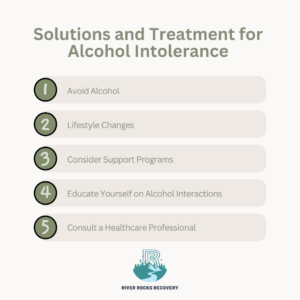Alcohol intolerance is when the body struggles to process alcohol effectively, leading to a variety of unpleasant reactions. For those experiencing alcohol intolerance, even small amounts of alcohol can cause discomfort. This can be confusing and concerning for many, as it can interfere with social situations and their lifestyle. In this blog post, we will explore the symptoms, causes, and solutions for alcohol intolerance, along with information on the role of Ohio Addiction Treatment Center in helping people who might struggle with alcohol consumption due to intolerance or dependency.
What is Alcohol Intolerance?
Alcohol intolerance is not the same as an alcohol allergy. It refers to the body’s inability to properly metabolize alcohol due to certain enzymatic deficiencies. When alcohol is consumed, it is broken down in the liver by enzymes. If these enzymes are not functioning effectively, or if there is a deficiency, the body can react negatively to even small amounts of alcohol.
Symptoms of Alcohol Intolerance
Symptoms of alcohol intolerance can range from mild to severe and often manifest shortly after alcohol consumption. Common symptoms include:
- Facial Flushing: A noticeable reddening of the face, neck, or chest that occurs rapidly after drinking alcohol. This reaction is often caused by an accumulation of acetaldehyde, a toxic byproduct of alcohol metabolism.
- Nausea and Vomiting: Individuals may experience gastrointestinal distress, including nausea, stomach cramps, or vomiting shortly after consuming alcohol, which can severely impact social situations.
- Headaches: Severe headaches or migraines may arise within a few hours of drinking, often making the experience of drinking alcohol very unpleasant.
- Rapid Heart Rate: An increase in heart rate or palpitations may occur, which can be alarming and uncomfortable.
- Low Blood Pressure: This can lead to dizziness, fainting, or a feeling of lightheadedness, particularly when standing up quickly.
- Skin Reactions: Hives, rashes, or itching can develop after consuming alcohol, indicating a potential histamine response.
- Breathing Difficulties: Some individuals may experience shortness of breath or wheezing, particularly if they have asthma or other respiratory conditions.
These symptoms can mimic those of a hangover or mild allergic reaction but are indicators of an underlying metabolic issue.
Alcohol Intolerance and Addiction
While alcohol intolerance itself is not a sign of alcohol addiction, it can complicate relationships with alcohol. Some people may still attempt to drink despite the discomfort, which can be dangerous over time. For those who struggle with both alcohol intolerance and dependency, seeking help from a professional treatment center is essential.
Addiction Treatment Center Ohio offer specialized programs to address not only alcohol dependency but also related conditions like alcohol intolerance. For those who need help moderating or abstaining from alcohol, they provide a range of Addiction Treatment Programs designed to support individuals in managing both physical and psychological symptoms.
Causes of Alcohol Intolerance
Several factors contribute to alcohol intolerance, including:
- Genetics: Genetics plays a significant role in alcohol intolerance. For example, many individuals of East Asian descent have a genetic deficiency in aldehyde dehydrogenase (ALDH2), an enzyme essential for breaking down acetaldehyde. When alcohol is consumed, this deficiency leads to an accumulation of acetaldehyde, resulting in severe reactions after drinking even small amounts of alcohol.
- Age: As individuals age, their liver function may decline, affecting their ability to metabolize alcohol. This change can lead to increased sensitivity and intolerance to alcohol over time.
- Medications: Certain medications can interact negatively with alcohol, exacerbating symptoms of intolerance. For instance, medications such as antihistamines, anti-inflammatory drugs, and certain antidepressants can have heightened effects when combined with alcohol.
- Underlying Health Conditions: Conditions like liver disease (such as hepatitis or cirrhosis), gastrointestinal disorders (like gastroesophageal reflux disease or irritable bowel syndrome), and allergies can impact how the body metabolizes alcohol. Such conditions may result in increased sensitivity or adverse reactions.
- Hormonal Factors: Hormonal fluctuations, especially during menstruation or menopause, can affect alcohol metabolism, making women more susceptible to alcohol intolerance.

Solutions and Treatment for Alcohol Intolerance
If you suspect that you or someone you know has alcohol intolerance, it is essential to take steps to manage the condition:
If you suspect that you or someone you know has alcohol intolerance, several strategies can help manage the condition effectively:
- Avoid Alcohol: The most effective solution for alcohol intolerance is to abstain from consuming alcohol altogether. This is particularly important for individuals who experience significant discomfort or health issues related to alcohol consumption.
- Consult a Healthcare Professional: If symptoms persist or worsen, it is vital to seek medical advice. A healthcare provider can help identify any underlying conditions, evaluate your alcohol consumption patterns, and recommend appropriate treatment options tailored to your needs.
- Educate Yourself on Alcohol Interactions: Understanding which medications or health conditions can interact negatively with alcohol can help you make informed choices about your health and avoid potential adverse reactions.
- Consider Support Programs: For those struggling with alcohol use or dependency, exploring alcohol rehab treatment programs or other support resources is essential. Programs such as the Partial Hospitalization Program, Intensive Outpatient Program, and Outpatient Treatment Programs can provide comprehensive support and guidance for individuals seeking to quit drinking or address underlying issues related to alcohol.
- Lifestyle Changes: Incorporating a healthier lifestyle can improve overall well-being and help manage symptoms related to alcohol intolerance. This includes:
- Eating a balanced diet rich in fruits, vegetables, lean proteins, and whole grains to support liver health.
- Staying hydrated, especially if you’ve consumed alcohol, to help alleviate some symptoms of intolerance.
- Engaging in regular physical activity, which can boost mood and overall health.
- Practicing stress management techniques, such as yoga, meditation, or deep-breathing exercises.
- Mindful Drinking: If complete abstinence from alcohol isn’t possible, and you suspect mild intolerance, consider limiting your alcohol intake and choosing drinks with lower alcohol content. Additionally, be aware of how your body reacts after consuming even small amounts of alcohol.
- Utilize Resources: Many organizations and community programs offer support for individuals with alcohol intolerance and addiction issues. These can provide valuable resources, such as support groups, counseling, and educational materials.
For those struggling with addiction alongside alcohol intolerance, Addiction Therapy Programs can help identify underlying issues related to alcohol use. Professional programs, such as Partial Hospitalization Program, Intensive Outpatient Program, and Outpatient Treatment Programs, can offer tailored support for individuals who are finding it difficult to manage their relationship with alcohol.
Seeking Help
If you find that alcohol is causing distress or dependency, regardless of whether it’s due to intolerance, it’s important to seek help. The Ohio Addiction Treatment Center offer comprehensive Addiction Treatment Programs that provide both medical and therapeutic support. These programs are designed to help individuals reclaim their health and well-being by providing resources and strategies to cope with alcohol-related issues.
Options like the Partial Hospitalization Program, Intensive Outpatient Program, and Outpatient Treatment Programs offer flexible solutions for those who need support but may not require full-time residential care. These programs ensure that you receive the help you need while maintaining some level of independence, making them ideal for individuals with busy schedules or those in the early stages of recovery. Embrace the comprehensive care offered at River Rocks Recovery, and contact us today at (888) 905-6281.
Conclusion
Alcohol intolerance is an uncomfortable condition that affects many people, but it doesn’t have to control your life. By understanding the symptoms, causes, and solutions, you can make informed decisions about your alcohol consumption. If you find yourself struggling with alcohol intolerance or dependency, know that there are effective Addiction Treatment Programs available to help you regain control. Whether you’re seeking support through a Partial Hospitalization Program, Intensive Outpatient Program, or Outpatient Treatment Programs, places like the Addiction Treatment Center Ohio can provide the help you need for a healthier, happier and a more relaxed and peaceful future.
FAQ on Alcohol Intolerance
What are the common symptoms of alcohol intolerance?
Symptoms may include facial flushing, nausea, headaches, rapid heart rate, low blood pressure, skin reactions, and breathing difficulties shortly after consuming alcohol.
What causes alcohol intolerance?
Causes can include genetic factors (like enzyme deficiencies), age-related changes, certain medications, underlying health conditions, and hormonal fluctuations.
How can I manage alcohol intolerance?
The best approach is to avoid alcohol altogether. Consulting with a healthcare professional, educating yourself about medications, considering support programs, and making lifestyle changes can also help.
Are there treatment programs for those struggling with alcohol use?
Yes, there are various treatment options available, including alcohol rehab treatment programs, partial hospitalization programs, intensive outpatient programs, and outpatient treatment programs. These can provide the support needed for recovery.




























